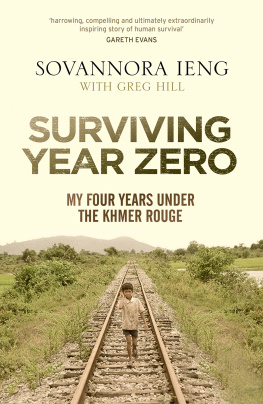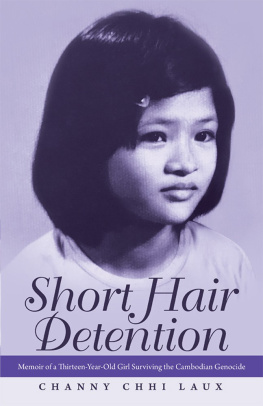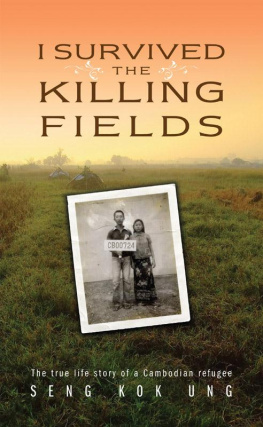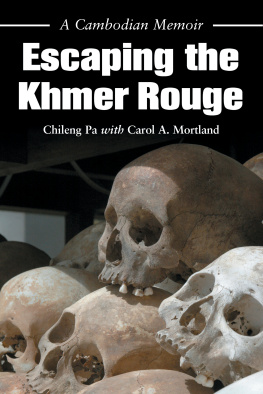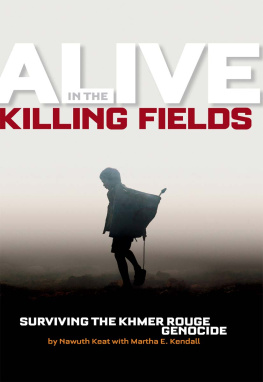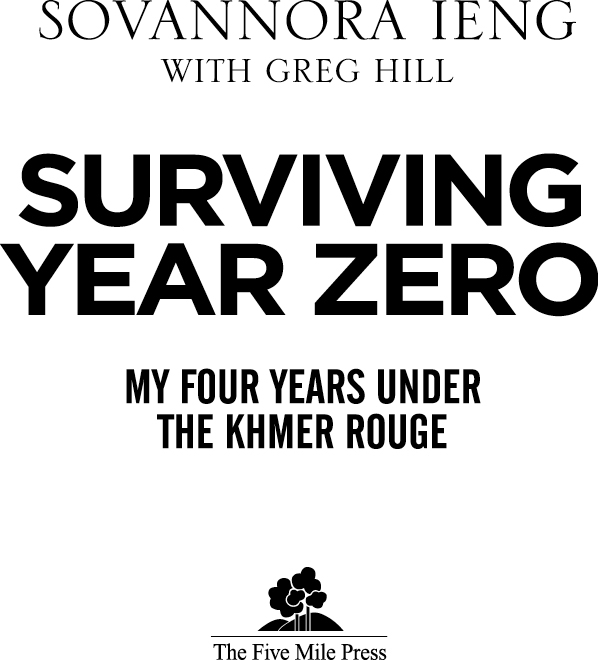For all those who were a part of my life during Year Zero, but especially my beloved mother, my constant source of inspiration, Mrs Iv Kim Huorng. Also for my stepmother and step-grandmother, and for Tevy, who kept my hopes alive
I wonder where you are now. I hope it is a good place.
Co-authors Introduction
I lay awake in bed last night, imagining. Ten years have passed since Sovannora first shared his story with me, yet its impact is still strong, threatening to devour my emotions and my spirit, as I wonder yet again how any of it could ever have happened.
Sovannora was nearly fourteen when the events described in this book began. My son Christopher is now fifteen and I wonder what if it was him? What if Christopher saw those things happen and endured the same experiences? I had read Sovannoras story dispassionately it is a wonderful story of survival and triumph in the face of adversity, but it took place in another country and involved other people.
But what if it was about my son?
Sovannoras book is about one person, yet it is the story of millions of people. It is a tale of the genocide that decimated Cambodia in the 1970s, and it is the story of all who have suffered in the face of intolerance, violence and brutality. It is everyones story, but it is not mine. While many will read Sovannoras story and remember their own suffering and the violence that took the lives of their families, I can think only of my son.
My son Christopher is thoughtful and has a good heart, and I love him immensely. So it is with great emotion that I imagine him being forced to witness murder, experiencing forced relocation, torture and starvation. I see him now, imprisoned, sleeping on a hard, bug-infested floor and longing for his one meal of rice a day. I see him wondering, steeling himself as others around him are executed or tortured, or slowly starve to death. I imagine him watching another boy placed into a cage so small that he fits only because his arms and legs have been broken. Then I wonder, what if that boy in the cage were him and those were his last hours, crying and sobbing while others watched helplessly as his life-force slowly diminished and the Khmer Rouge looked on.
I feel my heart is being torn apart as I think of how Christopher would feel. The suffering, the desperation I dont think my son could survive, even if he remained alive. Then I think of my friend how did Sovannora survive? His experience of genocide lasted not days or even months, but four years. Even his final escape was across a minefield, where others were being blown up in front of his eyes in their mad race for freedom.
Sovannora is alive now. He went through these events and worse. I have no idea how he kept his sanity and remained a decent, caring person. But he is only one of millions who survived these atrocities with scars I cannot fathom.
As the true events told in Sovannoras story touched me again last night, they have touched the world ever since they took place. The pain does not go away. It stays with the victims and their country forever.
Yet Sovannora prevailed. His is a story of survival in an environment where survival was impossible. It is a powerful story that must be told so that we can learn from the terrible things that we, as humans, have too often done, and still do, to each other.
Sovannoras is a small but urgent voice that says: Stop! We cannot go on killing and torturing, abusing and maiming. We cannot go on allowing these things to happen on any part of this planet.
Greg Hill
Introduction
I am Sovannora, a refugee who escaped Cambodia in 1980. I write as a survivor of the time known as Year Zero, which extended over four calendar years. Between 1975 and 1979, the Khmer Rouge emptied the cities of Cambodia and killed two million people through starvation, overwork and execution. More than thirty years later, my country has hardly begun to recover.
Though little has been said in the international media, the Khmer Rouge trials for war crimes have been taking place since 30 March 2010. So far, the only person to stand trial is Kaing Khek Eav, better known as Duch, a relatively junior prison warden. He was convicted and sentenced to nineteen years in jail for his role in 15,000 deaths. Trials of more senior Khmer Rouge have become bogged down in legal arguments, and many perpetrators will never be held to account. Is this justice?
I cant shake the trials from my mind as I step out of my townhouse and walk the streets of Phnom Penh. My country is crying, but the international tribunal is busy, and the rest of the world seems to pay little attention. The anguish expressed in court by surviving victims has barely registered in the Western media. But I believe there are lessons for us all to learn from Cambodias experience, stories to tell for the sake of the survivors and for those who didnt make it.
What is going on in Cambodia today? Do you know? Do you care? The people of Cambodia do care. Everyone does we must, for the years when the Khmer Rouge held power have shaped our culture and our way of life. There are three generations of Cambodians who will never forget that time.
When I think about the trials, I cannot escape the past. Like millions of others, I witnessed the incidents that led to the trials. I watched the regime ruthlessly target teachers, managers, doctors, engineers, soldiers, students and senior government officials, dispersing them through the countryside, forcing them to work for starvation rations, spying on their conversations, persecuting them and killing them. I saw the murderous Khmer Rouge regime destroy trust between neighbours and family members. All we could think of was how to stay alive for one more week, one more day, one more hour.
I hope my story will inspire you to think about the challenges that face us all. Many in the West take affluence for granted. The perils facing poorer nations happen somewhere else; they are out of sight and out of mind. But if developed countries turn their backs, events such as those we have seen in Cambodia will happen over and over again.
I want this book to be a lesson learnt from the worlds cruellest recent wars the genocide conducted by the Nazi regime during World War Two, and the systematic brutality inflicted on Cambodia under the rule of the Khmer Rouge. My experiences have taught me the preciousness of political and spiritual freedom. This book is for all those who have fled injustice across the world, and for all who want to understand who we are and who we might become.
Chapter 1
At Peace in Phnom Penh
I was born on 1 June 1961 in Phnom Penh, the capital of Cambodia. Sandwiched between Thailand and Vietnam, Cambodia was an agricultural land of lakes and paddy fields, forests and ancient temples. There was little poverty. Food was cheap because natural resources were plentiful and the countryside was lush. The tropical climate had only two seasons, one hot and the other wet.
Phnom Penh was a large, bustling city, known as one of the most beautiful in South-east Asia. Old French colonial buildings mingled with modernist constructions in a distinctive Khmer style, which was fostered by King Norodom Sihanouk after Cambodia became independent in 1953. It was a harmonious environment to grow up in. At night, the city glowed under streetlights, and local businesses sold goods on the streets until four or five in the morning. People could travel anywhere without fear.
I was the third son in a family that eventually grew to eleven children. My family had maids and workers to help us. We treated them like our relatives, and one of our workers married one of the maids. All our neighbours were good to us regardless of whether they were poor or rich, Vietnamese, Chinese or Cham (Khmer Islamic).

